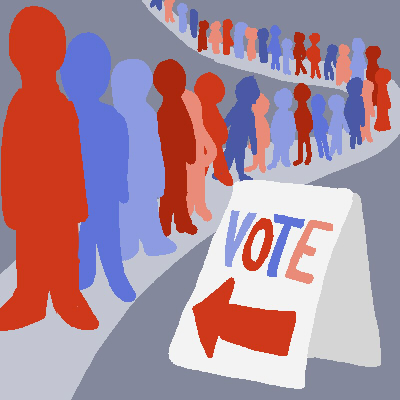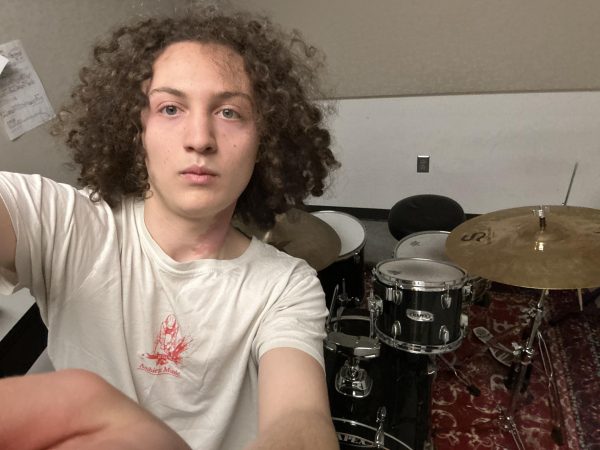With all the talk about this year’s contentious presidential election between Vice President Kamala Harris and former President Donald Trump, down-ballot elections often go overlooked. According to U.S. Vote Foundation, despite local governments helping build consensus and having a greater impact on our day-to-day lives than the federal government does, at least one-third of voters do not fill out the entire ballot. The Mac Weekly has compiled a guide to the constitutional amendment, city questions and contested down-ballot races that will appear on the ballots of Macalester students voting in Ramsey County this Tuesday, Nov. 5. All candidate information comes from candidates’ websites unless otherwise noted.
Macalester students living in Ramsey County can register to vote in Minnesota on election day at their polling site using their Mac ID instead of traditional proof of residency. On-campus students choosing to vote in the state will vote at Macalester Plymouth Church, which will be open for voting from 7 a.m.–8 p.m. this Tuesday. Any voters in line by 8 p.m. will be allowed to vote. Off-campus students can find their polling site on mnvotes.gov or using this link. Minnesota voters can call 651-215-1440 from 8 a.m.-4 p.m. with election-related questions.
U.S. Senator
Amy Klobuchar (Democratic-Farmer-Labor) has served as Minnesota’s senator since 2007, when she was the first woman elected to the role. Since then, she has garnered a reputation for putting aside partisanship in order to support the economy, families, workers and businesses. In Congress, she has worked to support the needs of Minnesotans, including by getting funding to rebuild the I-35W bridge after it collapsed, and by working to pass bipartisan Farm Bills to strengthen the rural economy in Minnesota. She has also worked on bipartisan legislation to lower prescription drug costs; led a bipartisan investigation into the Jan. 6 insurrection; spearheaded the Freedom to Vote Act, which aims to protect voting access by expanding voter registration and making Election Day a federal holiday, among other measures; expanded access to high-speed internet and advocated for legislation that would fund police, civil rights, criminal justice and immigration reform. Before she was elected to the Senate, Klobuchar spent eight years heading Minnesota’s largest prosecutor’s office, where her focus was on prosecuting foreign criminals. She also successfully advocated for a law guaranteeing 48-hour hospital stays to people who have just given birth, and to their babies.
Royce White (Republican) is a former professional basketball player. Border security and reducing the national debt are his top legislative priorities. He also aims to establish term limits for the House and Senate; change voting law so that Election Day is a national holiday but people can only vote on that single day, on paper and with an ID; prioritize American manufacturing and cut taxes everywhere he can. Believing that the current federal government is corrupt, White supports small government. He also supports the Second Amendment and opposes abortion. Seeing globalism as an enemy of the U.S., White wrote on his website that we must “take a stand for God, Family, and Country” against it.
Joyce Lynne Lacey (Independence-Alliance) has worked as a reporter, teacher and author. She now hopes to defend freedom and constitutional rights and serve as “a voice for those whose voices have been silenced” by advocating for marginalized people, promoting justice and security for everyone and creating stability through systemic changes. Her main priorities include reforming guardianship and conservatorship, building affordable housing in order to fight homelessness, controlling inflation and the national debt and securing the borders to stop illegal immigration that she sees as contributing to human trafficking. In her blog posts, Lacey expressed disagreement with mask mandates and what she sees as forced vaccinations and the loss of parental rights.
Rebecca Whiting (Libertarian Party) defines herself as a Christian, veteran, small business owner, wife and mother to a large family. On her website, she declared “it’s time for less 1984, and more 1776.” Whiting’s priorities include listening to the working class through cuts to inflation and the national debt, reducing U.S. foreign presence, implementing free market solutions, reducing the size of the government and allowing small businesses to prosper.
U.S. Representative – District 4
Betty McCollum (Democratic-Farmer-Labor) has been District 4’s U.S. representative since 2000, when she was the second female Congressperson representing Minnesota. Her priorities include investing in education, health care, modern infrastructure and Native American communities; offering affordable and quality higher education; working towards democracy, human rights and an end to poverty in developing countries and implementing universal health care. In the House, she serves as the top Democrat on the Defense Subcommittee of the House Appropriations Committee, where she supports U.S. armed forces in order to bolster national security, and on the Interior-Environment Appropriations Subcommittee, where she works to invest in the environment, Native American communities and the arts. She has co-sponsored resolutions and signed joint letters advocating for the prevention of violence in Gaza, a ceasefire, a two-state solution, accountability for the Israel Defense Forces and a condemnation of antisemitism.
May Lor Xiong (Republican) is running for U.S. Representative because she is frustrated with the economy making life hard for working families, because she wants to “restore and protect our American dreams, ideals and traditions” and safeguard the Constitution and because, as an immigrant from a refugee camp in Thailand, she feels indebted to the U.S. Her priorities include ending “excessive money printing and reckless spending” at the federal level in order to reduce inflation and closing the border, which she sees as a national security threat that lets potential terrorists enter the U.S. and that has caused tens of thousands of American deaths due to drug trafficking, human trafficking, and crime. She also prioritizes “protect[ing] and restor[ing]” Title IX so as to “stop erasing women” and shifting education policy by allowing parents to choose where their kids go to school and teachers to teach the way they want to.
State Representative – District 64A
Kaohly Vang Her (Democratic-Farmer-Labor) is District 64A’s current state representative. Before becoming the representative, Her organized for criminal justice reform, affordable healthcare and access to equitable education. As an immigrant whose family experienced financial struggles, Her believes that her ability to overcome adversity “gives [her] a unique perspective on what systems changes are required in order to meet the needs of Minnesotans,” she told Minnesota Public Radio (MPR) News. Her top priorities include investing in early childhood education; advocating for a single-payer healthcare system; breaking the cycle of poverty by addressing needs for housing, food security, transportation and affordable healthcare and implementing sustainable sources of food and energy. She has also been having discussions with voters about the importance of pensions and the right to unionize, according to MPR News. Through her government service, Her hopes to give back to the community, uplift her neighbors, create opportunities and address systems of oppression and harm that limit upward mobility.
Dan Walsh (Republican) identifies with St. Paul as a lifelong St. Paul resident who owns multiple properties in the city, according to the East Metro Voter Guide. He has worked in Information Technology, especially cybersecurity, for 20 years, which inspires him to “implement rational, logical, empirical approaches to solving complex issues to lower the risk,” he told the East Metro Voter Guide. His top priority is public safety. According to MPR News, the issues Walsh has been discussing with voters include fighting crime through strong public safety measures that retain respect for individual rights, supporting fiscal discipline instead of what he called “reckless government expenditures that burden taxpayers and harm economic growth” and promoting school choice while reducing the role of the bureaucracy in schools. Walsh is running so that voters have a choice and a different perspective, with the goal of “a vibrant democratic process,” he told MPR News.
What City Question 1 says
In the Nov. 5 election, voters in Ramsey County can expect to see two St. Paul City Questions and a state constitutional amendment renewal request.
The first City Question on the ballot — and the most contentious thus far — asks voters whether or not the City of St. Paul “should … levy taxes to provide early learning subsidies.”
If passed, the proposal would raise property taxes in Ramsey County by $2 million a year, compounded annually until the 10th year, when a cumulative $20 million is levied. These property tax levies would subsidize early learning for low-income families through programs administered by a city department. In the language of the ballot question, these subsidies will come at “no cost” for these families, “increase the number of child care slots” and “support the child care workforce” over this 10-year window.
However, debates have been sparked over the promises of the language used in the question. Mayor of St. Paul Melvin Carter said in mid-October that for this reason, he would not implement the proposed policy. Carter argues that promising early learning for low-income families at “no cost” is incorrect. Carter points to a recent City financial analysis estimate that providing the full extent of the proposal would require over $100 million a year.
What City Question 2 says
The second City Question on this November’s Ramsey County ballot proposes a change in City election years to be held in the same year as presidential elections. The past two presidential elections in St. Paul have seen voter turnout three times greater than the mayoral and City Council elections. The proposal is intended to increase voter turnout by eliminating the City’s current off-year city elections in favor of presidential election years.
City staff, including City Council President Mitra Jalali and Carter, have raised concerns about the proposal, saying that if passed, it could lead to an excessively packed ballot. Additionally, Jalali worries that some presidential ballot limits for City Council candidates and St. Paul’s ranked-choice voting system may present challenges for integrating City elections onto presidential ballots.
State Constitutional Amendment: Environment and Natural Resources Trust Fund Renewal
In addition to the two city ballot questions, there will also be one state constitutional amendment renewal request. The amendment asks voters whether or not they support the transfer of state-operated lottery proceeds “to protect drinking water sources and the water quality of lakes, rivers and streams; conserve wildlife habitat and natural areas; improve air quality and expand access to parks and trails.”
Failure to vote on a constitutional amendment in Minnesota will have the same effect as voting “no” on the amendment.
The constitutional amendment was approved first in 1988 and renewed on two subsequent occasions. Known as the Environment & Natural Resources Trust Fund (ENRTF) in Minnesota, 1the amendment has invested more than $1 billion into numerous research and restoration projects across the state since its establishment.
Chief Justice of the Minnesota State Supreme Court
Voters in Ramsey County may be surprised to see nearly half of their ballots containing judicial elections, races many times overlooked by the average American.
Current Chief Justice Natalie Hudson was appointed to her position in October 2023 and is seeking election in this year’s November 5th election. Chief Justice Hudson strongly advocates “for the interests of all Minnesotans in having fair, accessible courts that are faithful to the law and responsive to the public trust.”
Stephen Emery, who is running against Chief Justice Hudson, has worked in the legal field for the last 28 years, the last 25 of which have been “invested in doing legal analysis and writing,” according to his website.
Emery believes strongly in reforming American Federal Courts and corporate regulations. Emery also has experience as a county agent, a sales representative for American Cynamid and as a medical representative for Lederle Laboratories.
Associate Justice 6 – Supreme Court
In 2023, Governor Tim Walz appointed Karl Procaccini, the incumbent, to the Minnesota Supreme Court. Before that, Procaccini served as Walz’s general counsel and deputy chief of staff and taught law at the University of St. Thomas School of Law and Mitchell Hamline School of Law. He has been recognized multiple times for his leadership and public service in the legal community. In his responses to Ballotpedia’s Candidate Connection survey, Procaccini wrote that three key messages of his campaign are fairness and equal justice, experience and hard work and empathy and collaboration. Procaccini’s candidacy is supported by nine former Minnesota Supreme Court justices and hundreds of Minnesota lawyers.
Matthew R. Hanson, an attorney at law who has practiced in Minnesota since 2018, is running to bring “an even handed, non-partisan jurisprudence to Minnesota’s highest court,” Hanson wrote on X, formerly known as Twitter, after he announced his candidacy. Running against Procaccini is fairly central to Hanson’s platform; he disagrees with Walz’s COVID-19 policies, with which Procaccini assisted, and believes that Procaccini would not be able to be independent and impartial in cases involving Walz and the executive branch because of his former work with the governor. In his responses to Ballotpedia’s Candidate Connection survey, Hanson wrote that honesty, independence and humility are the most important characteristics of an elected official. He also wrote that he admires Associate Justice of the Supreme Court of the United States Clarence Thomas.
Judge 12 – Court of Appeals
Judge Diane Bratvold (incumbent) was appointed to her current position by former Gov. Mark Dayton (D) before being elected later in her own right. She has served in this position since 2016 and has nearly 40 years of legal experience including over 400 opinions and over 1,200 appeals.
Jonathan Woolsey is a graduate of the University of St. Thomas and William Mitchell College of Law and has almost 14 years of legal experience.
“My motivation [for running] stems from my deep belief in the importance of an independent judiciary that adheres strictly to the rule of law,” Woolsey wrote on his website. “With experience at the trial, appellate, and Supreme Court levels, I understand the need for impartiality in judicial decision-making.”
Judge 3 – District Court
Judge Timothy Carey (incumbent) was appointed to his current position by Governor Walz in April 2022. Timothy Carey is one of three judges on the first-ever Behavioral Health Team within the Civil Division and has been both a probation officer and prosecutor.
Paul Yang is a first-generation Hmong immigrant and has over 15 years of legal experience.
“I have extensive courtroom experience before the Department of Labor and Industry, Office of Administrative Hearings and the Workers’ Compensation Court of Appeals — including Alternative Dispute Resolution hearings at the American Arbitration Association,” Yang said on his website.
Additionally, Yang stresses his community service experience in the Twin Cities and elsewhere as a qualifying feature of his campaign.
Judge 29 – District Court
Timothy Mulrooney, the incumbent, has 16 years of judicial experience, the last eight of which were as a Ramsey County judge. His work during that time has centered around his values of fairness, impartiality and reasoned decision-making. For the past several years, Mulrooney’s work has focused on people with severe mental illness and chemical dependency. For instance, he co-chairs the the Second Judicial District’s Mental Health Gap Workgroup, whose goal is to respond to actions caused by mental illness more justly and effectively. He is endorsed by seven retired Minnesota Supreme Court justices, 10 former judges and many attorneys and community supporters.
Winona Yang is a legal author, adjunct professor at Mitchell Hamline School of Law and longtime community organizer. As an organizer, she has advocated for justice in housing, transportation and the environment. The three key messages of her campaign are bringing the judiciary to the community and increasing judges’ civil engagement, building public trust in the justice system so that people are more likely to use it to report things like sexual assault and harassment and streamlining case management practices to make court dockets less overcrowded, according to her responses to Ballotpedia’s Candidate Connection Survey. Yang also wrote that it is important for elected officials to have “a heart’s desire to create a more just society.”












